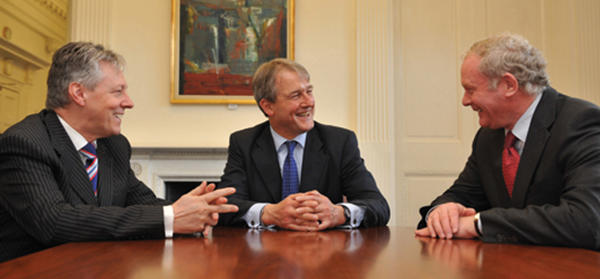Hillsborough’s new tenant: Owen Paterson
The first Conservative Secretary of State since Sir Patrick Mayhew, Owen Paterson has said he will remain pro-union in the post but will work with all parties in the province.
Always the likely choice to succeed Shaun Woodward, the former shadow Owen Paterson was selected as Northern Ireland Secretary as the full details of the Liberal- Conservative coalition were made public.
Paterson faced down any speculation that the position would be one afforded to either the Lib Dems’ Alistair Carmichael or a consolation prize for senior Tories who had lost out on other cabinet posts.
The Cambridge graduate held the shadow brief from July 2007 and is the first Tory Secretary since Sir Patrick Mayhew, who retired in 1997 amid the Labour landslide.
While the coalition as a whole will likely be allowed a honeymoon period, Paterson is unlikely to enjoy the same. Already he faces a decision on the Saville Report. Mark Durkan commented that although the NIO has a much-reduced role, it will still affect the North, adding that “publishing the Saville Report could be his first major parliamentary outing as Secretary of State.”
The Foyle MP also accused Paterson of “less than sensitive utterances” on the inquiry and said that he had caused the families some worry but that his understanding of the situation has improved.
Within minutes of Durkan’s statement, the DUP’s Gregory Campbell added pressure on the new man, warning that any decision on the report should not be as result of political pressure. Paterson has confirmed that he would like to see the report published as soon as possible.
Understood to be central to the failed Conservative-UUP pact, Paterson’s elevation to the job shows the trust put in his judgement by the new PM. But others hold different views. After holding talks with the DUP and UUP at Hatfield House, he was accused of promoting unionist unity.
The 53 year-old won the West Midlands North Shropshire constituency with a majority of 15,828 this time out. Acknowledged to be a good time manager, his role is of course muchreduced from any other Secretary of State before him as a result of the devolution of policing and justice.
Speaking locally on his first visit as Secretary of State, Paterson said that he was “keen” to publish a paper looking at devolving business tax to the devolved areas, adding that it would be irresponsible not to do anything about the 77.6 per cent GDP reliance on the public sector here.
The incoming government will honour its 50-day emergency budget commitment on 22 June but Paterson will face opposition from the 13 sitting Northern Ireland MPs to stave off cuts to Northern Ireland.
Re-balancing the local economy, though, is the long-term plan. Indeed it will take 25 years according to Paterson. Critics say that timescale is far from ideal and needs to be sooner but CBI Director Nigel Smyth sees that scale as more realistic.
On what Northern Ireland could expect to experience Smyth explained that it would depend very much on the fiscal situation across the UK, which he said was “quite horrendous”.
Paterson was the Conservatives’ Agriculture Spokesman from October 2005, leaving to take up the transport brief in late 2006.
First elected in 1997 to the Commons and born and bred in Shropshire, he was managing director of his family’s leather business and President of the European Tanners Confederation before he entered politics.






